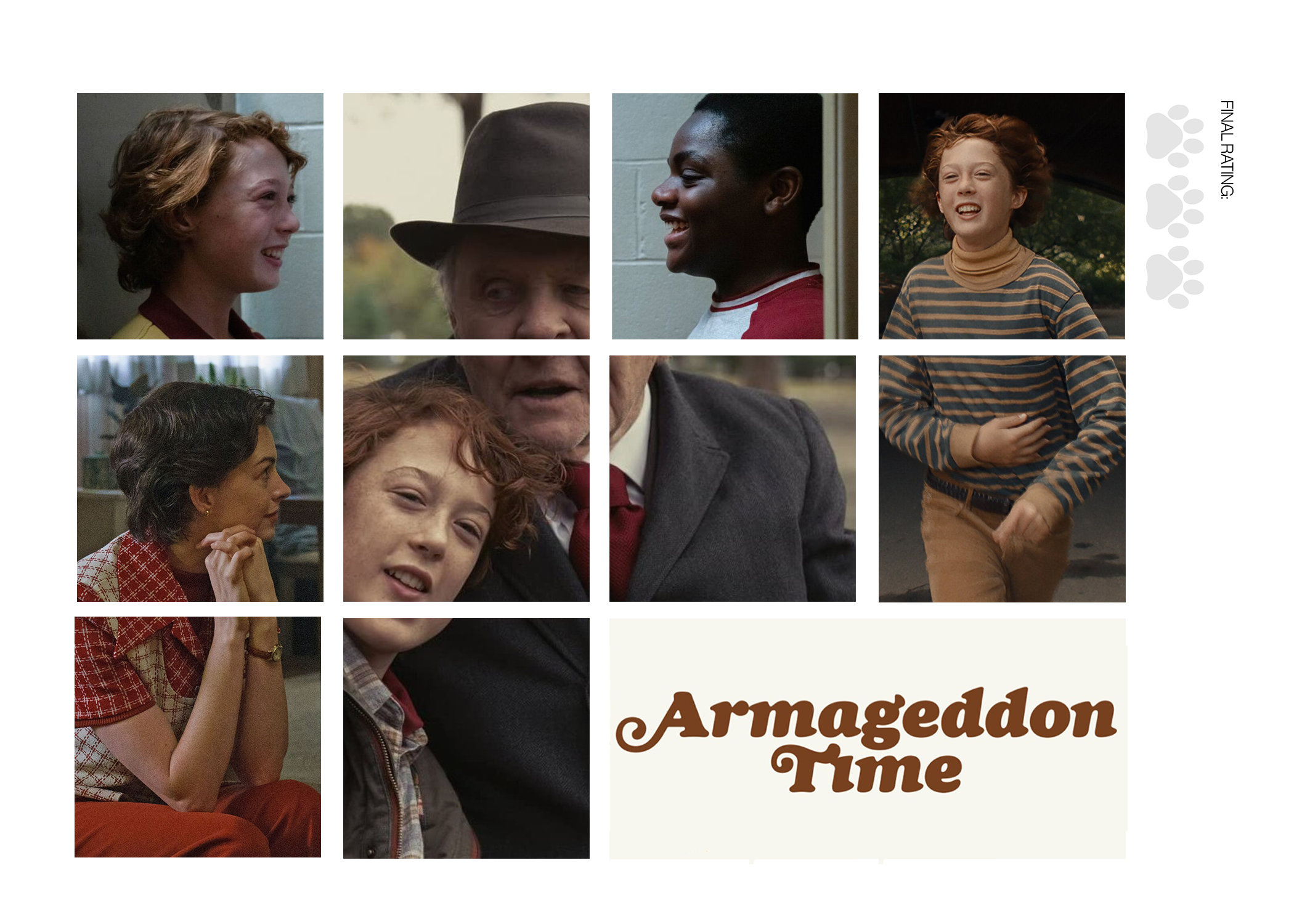Review | ‘Armageddon Time' focuses on childhood innocence and how quickly it disappears
James Gray paints a slow-moving portrait of what it meant to be a child in 1980. Photo collage by SIMRAH AHMAD, staff photographer
It seems my responsibility to warn Chapman students that a great travesty is on the horizon. And this travesty is that James Gray’s “Armageddon Time” is on its way to being a great but overlooked film, if the empty theater I sat in quietly on a Sunday night is any indication.
Gray’s autobiographical, coming-of-age film follows the young Paul Graff (Banks Repeta) as he grows up in 1980s Queens. The child of first-generation Jewish immigrants, Paul befriends one of the only Black students at his school, Johnny (Jaylin Webb), and the two youths are set on a path of rebellion that, as any audience can assume, does not end well.
The film does not have much of a solid plot, but is instead a series of events, all seeping into one another until we reach a final conclusion. Usually, films where “not much happens” would turn me away, even when the category is filled with critically beloved films like “Before Sunrise” and “Licorice Pizza,” a film that I called “pointless” when leaving the theater last year.
But “Armageddon Time” manages to escape the proverbial dog house because the message it is attempting to convey is clear from beginning to end. Paul is a child. He is young, innocent and has great big dreams. But he is also a child born in 1980, in the midst of the Cold War and just before Reagan was elected. He does not yet understand what it means to be Jewish in the ‘80s nor how skin color can impact the way people are treated — and all we can do is watch as this innocence is decimated.
Gray’s script does a nice enough job of telling the story through a child’s point of view. Though at times this is done by using abrupt and cringe-worthy cuts to Paul’s dreams of moving to Florida or becoming an artist, the sentiment remains the same.
There are several lines throughout the film that — maybe a little too accurately — portray how an adult might explain the world to a child. When Paul’s grandfather, played by Anthony Hopkins, explains anti-semitism at the dinner table, his story of being told by a university “We have enough Spinowitzes here,” strikes a specific chord, especially today in light of a Kanye West’s recent anti-semitic language.
Race is a difficult subject to broach with any child, and an unsettling dread starts to set in as you watch Paul and Johnny get themselves into trouble. We all know just how the cops will treat a young Black kid, but Paul doesn’t. He cannot yet recognize his privilege, stealing money from his mother (Anne Hathaway) because he still thinks they’re well off.
Meanwhile Johnny is fully aware of the raw deal he’s been handed. A version of this story we don’t quite get a look at, a missing piece probably, but Gray, a white male, would not be qualified to tell it.
In the past ten years, more recognition has been given to child actors that take on difficult roles, most notably Jacob Tremblay in “Room” and Quvenzhané Wallis in “Beasts of the Southern Wild.” Though Repeta’s character does not endure traumatic experiences on par with the two just mentioned, the star of “Armageddon Time” experiences a more relatable home life, making it all the more emotionally jarring.
When he sits in the car with his father, played by Jeremy Strong, he knows he’s in trouble, yet pleads with his dad. “You don’t have to hit me,” he says. In every sentence, every tear, every laugh, Paul becomes a real, living, breathing child. He is clearly based on a real person. And yes, we might think he is a little snot who disobeys his parents, but what kid isn’t?
The movie is, if you’re not paying attention, boring. As I said, there’s no real plot but events that build and build until they explode and an armageddon takes place. It doesn’t seem to me that Gray set out to make a shocking film, storywise or visually as the composure of most shots is quite simple. Instead he sat back and decided to let the message speak for itself.
In the final scene, Fred Trump (played by John Diehl) tells the students of Paul’s private school that they are the future — even though these are the same kids who make jokes about the N-word.
Paul thinks this is just as ridiculous as we do, because over the past almost two hours, his naivete has died. When his grandfather tells him, “It’s hard to fight, isn’t it?” he is no longer able to pretend the world isn’t a difficult place.
He is grown up now, even if he’s too young to be. It seems a sad thought that this was the case for several kids growing up in the ‘80s, and maybe this film is for them or all kids who grew up too fast.
I wouldn’t be surprised to see this film up to bat in the coming awards season, especially Hopkins who might receive award recognition just because he’s Hopkins. But I would pay attention to screenplay categories and look out for Gray’s name.
If a film can handle immigration, race and anti-semitism all at once, that is an achievement worth being lauded. Afterall, it's the films you don’t see coming that surprise you. And I would say “Armageddon Time” was a pleasant surprise.


